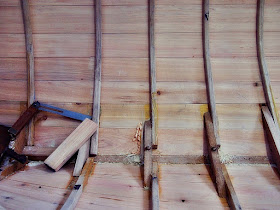 |
| Both boats seen here, the carvel in the foerground. |
 |
Interior of the carvel Whitehall. |
 |
Fine entry of the carval boat, flanked by the whaleboat on the left and the lapstrake on the right. |
 |
| The lapstrake Whitehall growing up around her molds. |
 |
Detail of the carvel boat showing her floor timbers and frames. |
 |
Slack bilges and flaring sides create a beautiful form. |
 |
| Here one can see the wineglass transom that characterizes the Whitehalls. |
 |
Planking up the lapstrake boat. |
 |
Workshop volunteer Nick Pagon clamps up a strake... |
 |
| and begins cutting the gain. |
 |
Lovely
all photos copyright Thomas Armstrong
The Whitehall is generally considered to be the quintessential American rowboat. The iconic design was derived from European models, fast rowing gigs, wherries and cutters. The name originates from Whitehall Street in New York City where they were first built. They ranged in length from 14 to 22 feet and are recognizable by their fine entry and distinctive wineglass transom. Considered to be one of the fastest, easiest rowing designs known they served as water taxi's, pleasure boats and are still a favorite with home and professional builders alike. They were first built in lapstrake and later carvel.
In a program that incorporates both CHAD students and workshop volunteers, two Whitehalls are currently underway at the Workshop on the Water in Philadelphia, one lapstrake and one carvel. They will join the workshop fleet when completed, hopefully by the end of June and will compete in rowing matches with the two extant Whitehalls in the small craft collection.
The project, overseen by lead boatbuilder at Workshop on the Water Bruce McKenzie, is building to John Gardner plans, with slight modifications by Nick Pagon.
See Gina Picton's student driven blog on the project here.
A further intro and appreciation of Gardner and his work can be found at the TSCA.
The project, overseen by lead boatbuilder at Workshop on the Water Bruce McKenzie, is building to John Gardner plans, with slight modifications by Nick Pagon.
See Gina Picton's student driven blog on the project here.
A further intro and appreciation of Gardner and his work can be found at the TSCA.
I apologize for the discrepancies in the spacing of the captions, the new 'blogger' and I are having some issues.
Originally published by Thomas Armstrong in 70.8%
No comments:
Post a Comment